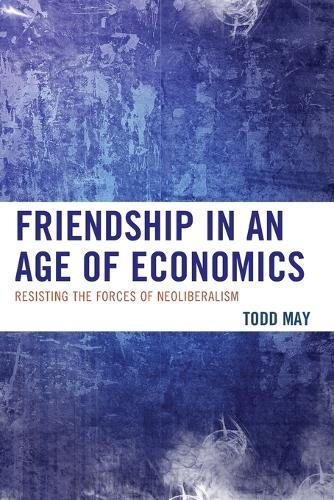Overview
We live in an age of economics. We are encouraged not only to think of our work but also of our lives in economic terms. In many of our practices, we are told that we are consumers and entrepreneurs. What has come to be called neoliberalism is not only a theory of market relations; it is a theory of human relations. Friendship in an Age of Economics both describes and confronts this new reality. It confronts it on some familiar terrain: that of friendship. Friendship, particularly close or deep friendship, resists categorization into economic terms. In a sustained investigation of friendship, this book shows how friendship offers an alternative to neoliberal relationships and can help lay the groundwork for resistance to it.
Full Product Details
Author: Todd May
Publisher: Lexington Books
Imprint: Lexington Books
Dimensions:
Width: 15.50cm
, Height: 1.30cm
, Length: 22.80cm
Weight: 0.254kg
ISBN: 9780739192849
ISBN 10: 0739192841
Pages: 164
Publication Date: 13 May 2014
Audience:
Professional and scholarly
,
Professional & Vocational
Format: Paperback
Publisher's Status: Active
Availability: Manufactured on demand

We will order this item for you from a manufactured on demand supplier.
Reviews
May's book makes many insightful claims and raises a lot of intriguing questions about the nature of friendship and its role in the good life. Notre Dame Philosophical Reviews Friendship in an Age of Economics is itself an important intervention concerning 'how we might live in the contemporary world with its particular power arrangements' (103)-and how we might change it. Anarchist Developments in Cultural Studies Todd May's important book is a powerful critique of the role neoliberalism plays in our personal lives, and of the type of life it encourages us to live. But May also presents an alternative based on deep friendship, and demonstrates the possibilities of overcoming the sense of hopelessness that so pervades modern America. -- Jules Lobel, University of Pittsburgh Law School Todd May's book on friendship in our age is the sort of book people used to complain philosophers don't write: smart, insightful, clearly written, on a topic of vital importance, and able to be appreciated by philosophers and non-philosophers alike. Aristotle, on whom May writes wonderfully, said that only beasts or gods have no need of friends. So if you don't fall into either of those categories, you owe it to yourself to read this book. -- John Protevi, Louisiana State University
Todd May's book on friendship in our age is the sort of book people used to complain philosophers don't write: smart, insightful, clearly written, on a topic of vital importance, and able to be appreciated by philosophers and non-philosophers alike. Aristotle, on whom May writes wonderfully, said that only beasts or gods have no need of friends. So if you don't fall into either of those categories, you owe it to yourself to read this book. -- John Protevi, Louisiana State University Todd May's important book is a powerful critique of the role neoliberalism plays in our personal lives, and of the type of life it encourages us to live. But May also presents an alternative based on deep friendship, and demonstrates the possibilities of overcoming the sense of hopelessness that so pervades modern America. -- Jules Lobel, University of Pittsburgh Law School May's book makes many insightful claims and raises a lot of intriguing questions about the nature of friendship and its role in the good life. Notre Dame Philosophical Reviews
Author Information
Todd May is Class of 1941 Memorial Professor of the Humanities at Clemson University.




